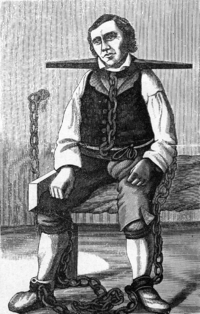Gjest Baardsen
| Gjest Baardsen | |
|---|---|
|
Gjest Baardsen | |
| Born |
1791 Sogndalsfjøra, Sogn og Fjordane, Norway |
| Died |
13 May 1849 (aged 58) Bergen, Hordaland, Norway |
| Nationality | Norwegian |
| Other names | Sogndalsfjæren |
| Occupation | Sailor, vagabond, songwriter, bookseller |
Gjest Baardsen (1791 – 13 May 1849) was a Norwegian outlaw, jail-breaker, non-fiction writer, songwriter and memoirist. He was among the most notorious criminals in Norway in the 19th century.
Personal life
Baardsen was born in Sogndalsfjøra, the son of fisherman Baard Gjestsen Fjæren and Maritha Pedersdatter. His father died in 1793. Baardsen married Anne Elisabeth Reinche in 1848.[1] His wife had two children with another man before the marriage.[2]
Criminal life and literary career
Baardsen was arrested several times for theft, and became legendary for his many successful escapes. From 1827 he served a life sentence at Akershus Prison, where he started a career as writer.[1] The first parts of his autobiography were published from 1835. He was held at Akershus for 18 years. After his release from prison in 1845 he earned his living as a songseller and bookseller, married and settled in Bergen.[1][3] Among his songs is a song on fellow prisoner Ole Høiland's escape from Akershus (1839), and a song on Høiland's death, "Ole Høilands Død" from 1849.[1] He wrote a collection of common words in the special sociolect called Fantespråk ("vagabond language"), which was utilized by Eilert Sundt in his studies, and published as Vandrings- eller skøiersprog in 1948.[1]
Legacy
The last part of Baardsen's autobiography, which covered his life after his release from prison, was published (posthumously) in 1869, and his full autobiography has been republished several times.[1] A film based on Baardsen's life was made in 1939, directed by Tancred Ibsen. Alfred Maurstad played the title character. The film Gjest Baardsen was among most viewed Norwegian films from the 1930s.[4] The song "Fjellsangen", performed by Maurstad in the film, became very popular.[4][5] His life has also been the basis for treatments in novels and plays, often based on his autobiography, in which he justified his crimes by claiming that he stole from the rich and wealthy and shared with the poor. Later research indicates that his own version is somewhat idealized.[1][2] Baardsen's childhood home in Sogndalsfjøra has been preserved and prepared for use as a museum.[2]
References
- 1 2 3 4 5 6 7 Erichsen, Bodil Chr. "Gjest Baardsen". In Helle, Knut. Norsk biografisk leksikon (in Norwegian). Oslo: Kunnskapsforlaget. Retrieved 15 February 2012.
- 1 2 3 Starheim, Ottar (ed.). Fylkeslekskikon Sogn og Fjordane (in Norwegian). III. Oslo: NRK. pp. 640–641. ISBN 978-82-8178-328-7.
- ↑ Godal, Anne Marit (ed.). "Gjest Baardsen". Store norske leksikon (in Norwegian). Oslo: Norsk nettleksikon. Retrieved 15 February 2012.
- 1 2 Svendsen, Trond Olav. "Gjest Baardsen – spillefilm". In Godal, Anne Marit. Store norske leksikon (in Norwegian). Oslo: Norsk nettleksikon. Retrieved 15 February 2012.
- ↑ Bremnes; Espeland; Mørkhagen; Sahlin Sveberg, eds. (1993). Norsk visebok (in Norwegian). Norway: Aventura. pp. 578–579. ISBN 82-588-0922-9.
